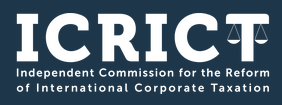Participants discussed reforms to address corporate tax avoidance, and its impact on poverty and inequality, at the inaugural meeting of the Independent Commission for the Reform of International Corporate Taxation (ICRICT).
A broad coalition of organizations initiated ICRICT, including Action Aid, Alliance-Sud, CCFD-Terre Solidaire, Christian Aid, the Council for Global Unions, the Global Alliance for Tax Justice, Oxfam, Public Services International, Tax Justice Network and the World Council of Churches.
 March 2015: Participants discussed reforms to address corporate tax avoidance, and its impact on poverty and inequality, at the inaugural meeting of the Independent Commission for the Reform of International Corporate Taxation (ICRICT). A broad coalition of organizations initiated ICRICT, including Action Aid, Alliance-Sud, CCFD-Terre Solidaire, Christian Aid, the Council for Global Unions, the Global Alliance for Tax Justice, Oxfam, Public Services International, Tax Justice Network and the World Council of Churches.
March 2015: Participants discussed reforms to address corporate tax avoidance, and its impact on poverty and inequality, at the inaugural meeting of the Independent Commission for the Reform of International Corporate Taxation (ICRICT). A broad coalition of organizations initiated ICRICT, including Action Aid, Alliance-Sud, CCFD-Terre Solidaire, Christian Aid, the Council for Global Unions, the Global Alliance for Tax Justice, Oxfam, Public Services International, Tax Justice Network and the World Council of Churches.
The ICRICT meeting convened in New York, US, from 18-19 March 2015. The Commission is expected to produce recommendations related to the UN’s financing for development (FfD) process and the Group of 20-Organization for Economic Co-operation and Development’s (G20-OECD) Base Erosion and Profit Shifting (BEPS) initiative, between March and July 2015.
“The world has changed but the international tax system has not,” explained former UN Under-Secretary-General José Antonio Ocampo. He said the Commission aims to “shed light on where the rules of the game, and the institutions that govern them, need to change.” He observed that debates on tax policy have been seen as technical discussions for accountants and lawyers, but that tax policy affects everyone. Ocampo emphasized, “there is a desperate need to bridge the gap between the technical challenges and everyone’s right to participate and provide solutions.”
The ICRICT aims to create a wider debate on reforms to the international corporate tax system. It is expected to examine allocation of tax rights between residence and source countries, public reporting and corporate requirements on reporting financial assets, among other issues. According to an ICRICT press release, the current international taxation system hinders poverty reduction efforts and reinforces global inequality, which could further limit achievement of the post-2015 development agenda. [ICRICT Press Release] [Meeting Agenda] [ICRICT Website] [UN Tax Committee of Experts on International Cooperation in Tax Matters]